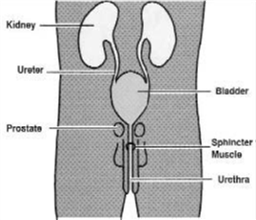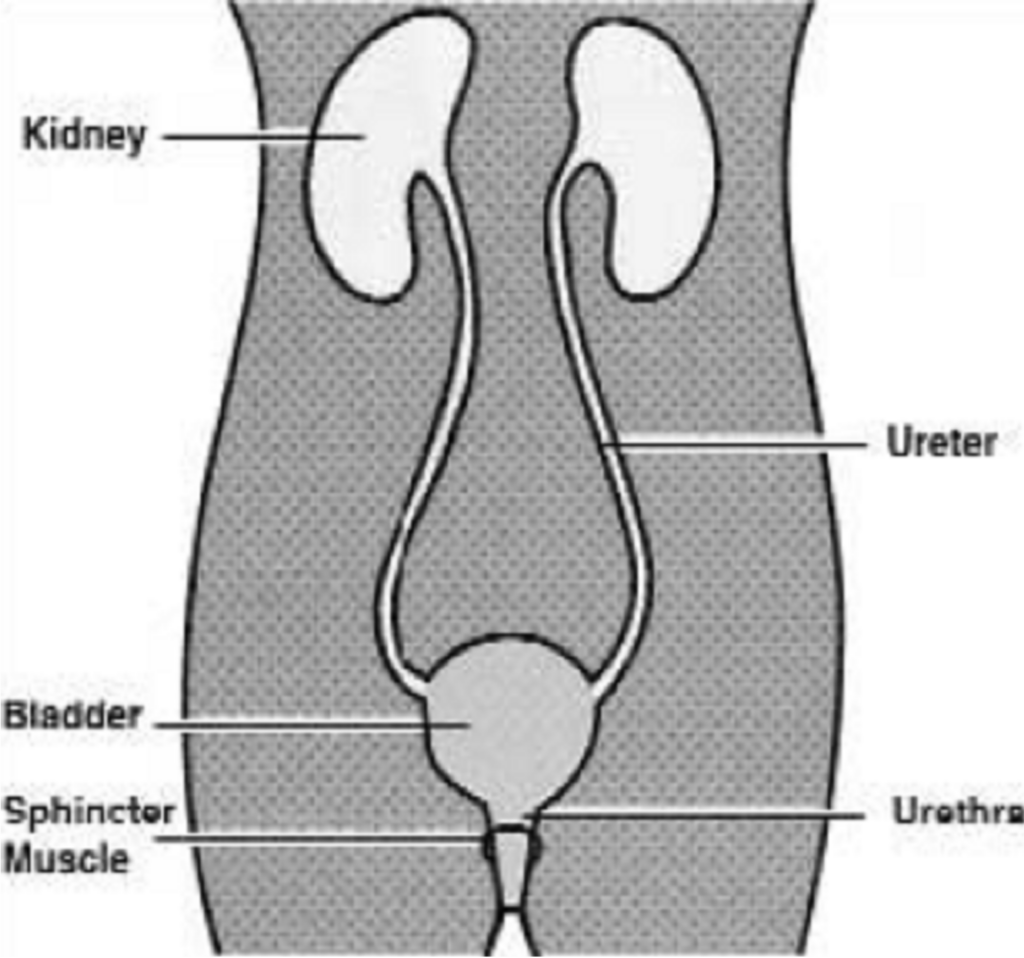Information for patients
This leaflet can be made available in other formats including large print, CD and Braille and in languages other than English, upon request.
This leaflet tells you about flexible cystoscopy and explains what will happen during the procedure.
What is a cystoscopy?
This is a procedure which allows the Doctor or Nurse to see the inside of your bladder. The bladder is a muscular bag, which when full, is about the size of a grapefruit. Urine is produced by your kidneys and is stored in your bladder. Urine then passes from the bladder along the urethra (water pipe).
The urethra in women is quite short (4cm or 1.5 inches). In men it is longer (20cm or 8 inches) and S-shaped as it passes through the prostate gland then down to the tip of the penis.
When you have a cystoscopy, a tube containing a tiny camera is passed along the urethra and into the bladder.
What is a flexible cystoscope?
A flexible cystoscope is a fine (thin) flexible tube which has a tiny lens at each end, joined together by a bundle of fibres. It can be moved or flexed to go along the curve of the urethra and look around the bladder.
Why do I need a flexible cystoscopy?
You have been advised to have a flexible cystoscopy to look into your bladder to help find the cause of some symptoms you have been having. You may be having this as follow up for a previous bladder problem. Some urinary symptoms are due to problems within the bladder or urethra.
You may have had other tests, scans or X-rays, or have had some blood in your urine and a flexible cystoscopy may be needed to look at the surface of your bladder as this cannot always be seen in enough detail on the other tests.


Are there any risks or possible complications in having a flexible cystoscopy?
Every effort is made to make sure the procedure is as sterile (clean) as possible. The scope will only be used for your procedure and will then be sent away to be sterilised.
Most patients have no problems during or following the procedure but you may experience:
- Mild burning or stinging when passing urine and having to pass urine more often than usual. This can last for up to 48 hours after the procedure.
- Blood in your urine. This can last for up to 48 hours after the procedure. This should gradually clear if you drink plenty of fluids.
- A urine infection. If you develop a high temperature, pain on passing urine and feel shivery, we recommend that you contact your GP immediately.
Will the procedure be painful?
You may feel some discomfort but most patients say it is not painful. Lots of lubricating jelly is squeezed into the urethra before the procedure to allow the tube to slide in easily and with as little discomfort as possible.
How do I prepare for my flexible cystoscopy?
No special preparation is needed and you can eat and drink normally. You should take all of your usual medicine or tablets.
What if I am taking Warfarin?
If you are using Warfarin, you must have your blood clotting levels (INR) checked 2 – 5 days before the procedure. If your INR is above 3.0, you cannot have the procedure as it may make you bleed.
You must telephone the department where you are going for the procedure (this will be on your letter) before you come to the hospital to make sure your blood clotting is okay for the procedure to be done. This will save you a wasted journey if the level is too high.
If your blood clotting level is too high, the hospital will contact your GP surgery and let them know so they can alter your Warfarin dose.
What will happen when I arrive for my appointment?
A Nurse will call you through to the unit, check your personal details, ask you questions about your health, check your blood pressure and pulse and explain the procedure to you. This is just to make sure you understand everything before you sign the consent form.
You should tell the Nurse if you have any allergies or have had reactions to drugs or other tests in the past. You should also describe any previous procedure you may have had.
You may be asked to give a urine sample.
We operate a list system. This means you will be seen when it is your turn and not the time given for you to arrive at the unit.
Before your examination, you will be taken to a private area and you will be asked to undress. You will be given a gown, together with your dressing gown and slippers to put on.
You may be taken to a waiting area with other patients while you wait for your procedure to start. When it is time for your flexible cystoscopy, a Nurse will take you to the examination room.
Your specialist Nurse or Doctor will explain the examination again and discuss the risks described earlier. If you have any questions or concerns, please talk to your Doctor or Nurse.
You will be covered with sterile sheets to keep everything clean and to expose you as little as possible. The genital area will be cleaned and the lubricating jelly inserted into your urethra. The flexible cystoscope will be gently passed along the urethra and into the bladder.
The Doctor or Nurse will be able to look through the lens and into your bladder.
Your bladder will be filled with clear water to smooth out any folds in the surface of the bladder so that all of the bladder lining can be seen. This will make you feel as though you need to pass urine; you will be able to go to the toilet as soon as the procedure is over.
The flexible scope is usually only used to look into the bladder. It is possible to take biopsies (samples of tissue) from the bladder lining through the scope.
If this is needed, the Doctor or Nurse will ask your permission before doing this. Any samples taken will be sent to the laboratory to be examined.
If you need any further treatment, you will be given another appointment.
When will I be told the results of my flexible cystoscopy?
You will be given the results of the examination straight away and you will be told if you need to come back to the hospital for further treatment, tests, or to be seen in the Outpatients Department. A relative or friend can be with you when you are told your results.
Some patients do not need any further hospital appointments.
Your GP will be sent a copy of the report within 48 hours of your discharge.
If biopsies were taken, these will be sent to the laboratory and you will have the results usually within 14 days of the procedure.
Will I need a follow up appointment?
If you need a follow-up appointment, you will be contacted by telephone or a letter will be sent to you in the post.
How will I feel when I go home?
Bleeding when you pass urine is normal and can last for up to 48 hours. The bleeding should not be heavy and should get better if you drink plenty of fluid. If the bleeding is heavy or you pass large clots of blood, you should contact the unit where you had the procedure (see contact numbers). If the unit is closed, you should contact your GP
How can I help myself?
It is important you drink plenty of fluids for 48 hours after your procedure, as this will help to reduce any discomfort or bleeding you may have.
If you have pain or discomfort, sitting in a warm bath or taking painkillers may help. Always follow the instructions provided in the leaflet supplied with your tablets.
You should contact your GP immediately if:
- You are in pain because you have stopped passing urine.
- You feel you have a high temperature or feel shivery.
- The pain on passing urine becomes worse or does not settle after 48 hours.
When can I return to work?
You can return to work as soon as you feel comfortable.
When can I have sex again?
You can have sex again as soon as you feel comfortable.
Contact
If you need further advice or have any questions, please contact your GP surgery or the unit where you had the procedure.
University Hospital of North Tees
Leven Unit
Telephone: 01642 383595
Monday to Friday, 7:00am to 8:00pm
Surgical Decisions Unit
Telephone: 01642 624566
Monday to Sunday, 24 hours a day
Access Lounge / Day Case Unit
Telephone: 01642 624168
Monday to Thursday, 6:30am to 10:30pm
Friday, 6:30am to 9:00pm
Saturday to Sunday, 7:00am to 7:00pm
University Hospital of Hartlepool
Day Case Unit – Hartlepool
Telephone: 01429 522949
Monday to Thursday, 7:00am to 9:00pm Friday, 7:00am to 7:00pm
If you have any worries or concerns, you should contact your GP during normal surgery hours. Outside of surgery hours, you should contact your GP’s surgery for the Out of Hours Service number.
Comments, concerns, compliments or complaints
Patient Experience Team (PET)
We are continually trying to improve the services we provide. We want to know what we’re doing well or if there’s anything which we can improve, that’s why the Patient Experience Team (PET) is here to help. Our Patient Experience Team is here to try to resolve your concerns as quickly as possible. The office is based on the ground floor at the University Hospital of North Tees if you wish to discuss concerns in person. If you would like to contact or request a copy of our PET leaflet, please contact:
Telephone: 01642 624719
Freephone: 0800 092 0084
Opening hours: Monday to Friday, 9:30am to 4:00pm
Email: [email protected]
Out of hours
Out of hours if you wish to speak to a senior member of Trust staff, please contact the hospital switchboard who will bleep the appropriate person.
Telephone: 01642 617617
Data protection and use of patient information
The Trust has developed Data Protection policies in accordance with Data Protection Legislation (UK General Data Protection Regulations and Data Protection Act 2018) and the Freedom of Information Act 2000. All of our staff respect these policies and confidentiality is adhered to at all times. If you require further information on how we process your information please see our Privacy Notices.
Telephone: 01642 383551
Email: [email protected]
Privacy NoticesLeaflet feedback
This leaflet has been produced in partnership with patients and carers. All patient leaflets are regularly reviewed, and any suggestions you have as to how it may be improved are extremely valuable. Please write to the Clinical Governance team, North Tees and Hartlepool NHS Foundation Trust, University Hospital of North Tees, TS19 8PE or:
Email: [email protected]
Leaflet Reference: PIL1179
Date for Review: December 2026